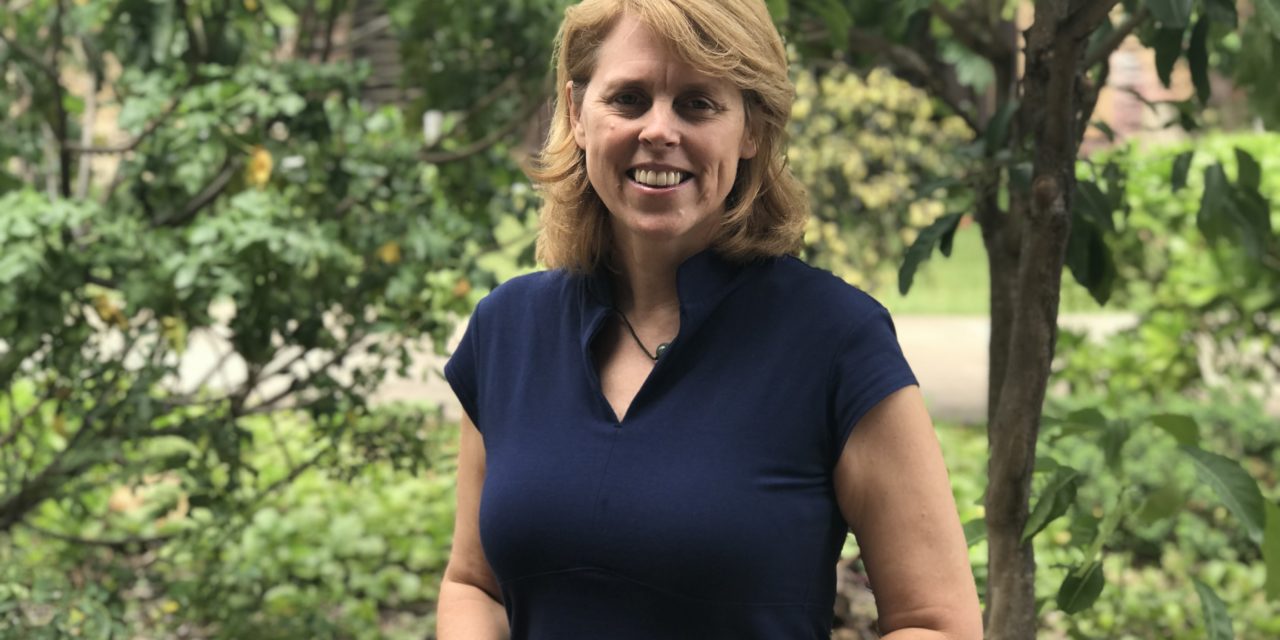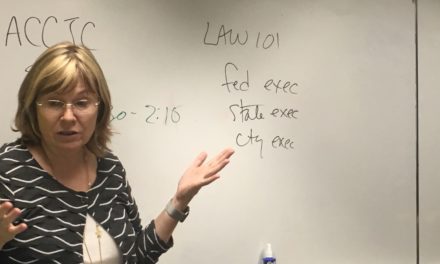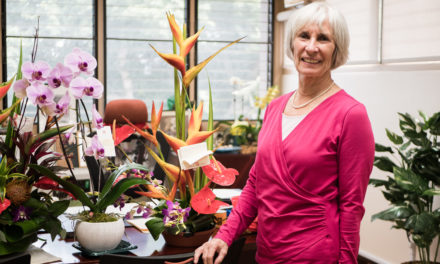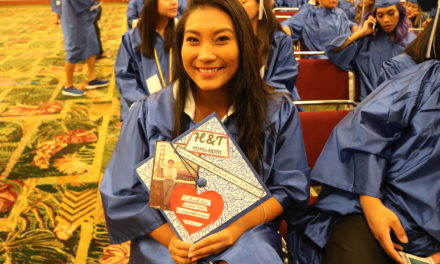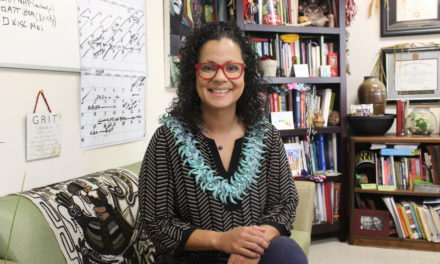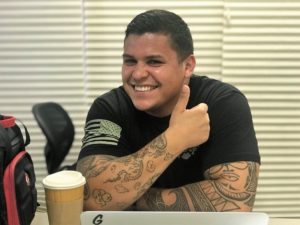By Jana Julian | Staff Writer
Thursday is a global celebration of the social, economic, cultural and political achievements of women around the world while calling to action the need for gender equality. International Women’s Day has been celebrated since the early 1900s, growing every year as women around the world campaign for their rights through rallies, marches, art performances and conferences.
While March 8 is the designated day of celebration, every day women are fighting for their rights and the rights of future female generations. Women have been establishing their places in positions historically dominated by men while inspiring young women and girls around the world to rise by showing them that anything is possible.
Kapiʻo News interviewed two female professors from Kapi‘olani Community College to highlight the achievements and accomplishments of just two of the many women on campus.
Dr. Wendy Kuntz, Associate Professor of Biology and Ecology
Experience:
• PhD in Ecology, Evolution and Conservation Biology under the discipline of Zoology from UH Mānoa
• Master’s degree in Environmental and Resource Science
• Bachelor of Science in Zoology
• Teaches Biology 124 (Environment and Ecology)
• Professional work and graduate work in Ecology and Ornithology
More than 10 years of teaching at KCC
What are some projects that you would like to see implemented in KCC, maybe something for students to do research on or extracurricular activities?
Well I have a lot actually already going on. So, we have a long-term project for students where students have been working with me to monitor the breeding biology of the white tern on campus, which is the Manu-o-Kū. I also have another undergraduate research project where we have KCC students working with the Department of Land and Natural Resources in the Division of Forestry and Wildlife, or DOFAW as it is called in Wailupe Valley, doing a forest monitoring and forest restoration project, and then I also have a long-term association with Malama Maunalua. We work with them, they’re a local community group kind of in our regional area, Maunalua Bay. We are a watershed here at Kapiʻolani [that] drains into Maunalua Bay. This is part of our community, and they have a couple of different emphasis but one they are most associated with is removing invasive algae from Maunalua Bay, and so our students have contributed to that project over the last eight years.
We also have native plant gardens on campus and the KCC rain garden, which our STEM students put in. One of my undergraduate students designed that rain garden, and she helped put that in [in] 2014 and that’s kind of an ongoing project. So, we have a lot of opportunities for students to get involved on projects on campus in Ecology and then also more broadly in sustainability.
What’s your favorite place you’ve gotten to travel because of your job?
Well, I’ll mention the place where I did my dissertation research on. I’m also faculty advisor for the KCC Ecology Club, and so the KCC Ecology Club has been able to come with me. We try to go almost every semester, go back to the place where I did my dissertation research on Big Island, which is Hakalua Forest National Wildlife Refuge. And so that’s a special spot in Hawai‘i because over 90 percent of the forest is endemic or native to Hawaiʻi, not found anywhere else, and when we take the students there it’s an opportunity [because] most people can’t just go to Hakalua, you have to be invited. So, we go there and provide service, we work with the horticulturist and help do forest restoration, which usually involves outplanting of native species. It’s really whatever is needed.
What is a problem that you see in the world that you think that your field would be able to better?
Well, I am a firm believer that Ecology is an essential field for all of us to understand. I should say Ecology and Environmental Science for how humans interact with the environment and how we depend on the environment and then Environmental Science [to] also study how we impact the environment. And so [to] understand many of the issues in the 21st century — especially global issues like climate change, understanding how ecosystems work and how energy moves through ecosystems — is incredibly important. I don’t think that we can solve any of the problems in the 21st century related to climate change and sustainability without a firm foundation of understanding the science of Ecology and Environmental Science.
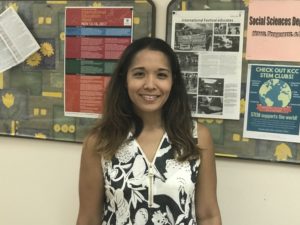
Dr. Jaclyn Lindo got into teaching by starting as a TA in her graduate program. (Photo by Jana Julian)
Dr. Jaclyn Lindo, Professor of Economics
Experience:
• PhD in Economics
• Teaches Microeconomics 130/Macroeconomics 131
• Health Economist
• Healthcare Analytics
Professor at KCC for 4 years
What made you decide to become a professor?
Well in grad school, most graduate programs offer assistantships to help finance your tuition, your room and board, and to give you experience in the classroom; you usually start off as a TA. In my case I got lucky in that my department was short on faculty, and I got a lot more teaching opportunities at the intro level. And it really gave me a better taste of actually being a teacher at the college level, so I really like it. When I was working in the private industry I was still lucky to have a flexible schedule, so I still taught. I lectured part time at UH Mānoa and then saw and opening here [at KCC] and thought, maybe try it full time and never looked back.
Are there any issues, particular to Hawai‘i that you think having economics skills or knowledge would be useful for?
I don’t know about useful for living through or experiencing the issues directly, but for policy making and decision making from a public [or] social perspective, I’d say it’s hard to not address the homeless issue, which is really multi-disciplinary because that also has a health component to it, mental health and availability of social services but also compounded by the high cost of living and the housing market. That’s one area where I think having expertise is very useful. In fact, the university just hired someone to help a housing analyst to help with that. I think even at the community level, just with a lot of the community organizations that are trying to build a sense of communities in their communities, helping them navigate even though they are not-for-profit institutions, they’re trying to be financially sustainable and having expertise with that management and with reaching out to gain more interest … it helps that even at that small, micro level helps a lot too.
Can you tell me more about the Green Initiative grant that KCC just received?
So, it was actually Dr. Kathy Ogata from Chemistry who has been working with her chemistry students in collaboration with the culinary students, taking their cooking oil, using the machine they have to convert it into biodiesel. And our Culinary department has been forward-thinking for decades now, very much ahead of their industry, and they use the biodiesel there for [which] they have a golf cart they use to transport things back and forth with. They have an aquaponic system that was fueling the pump for that system; they also are doing some hydroponics.
So, where we fit in with econ students, [which] it hasn’t quite gotten off the ground yet as it just got started — we just got notification a few weeks ago — students will be doing some analysis of cost savings, possibly even tying it into general operations of say, any business in the hospitality sector. … I’m still trying to figure out all the little details, but the collaboration between three disciplines on campus that are seemingly unrelated — chemistry, culinary and econ — is just really exciting, and that the system has recognized the effort there by giving us that SEED funding is really meaningful. And that the idea behind that particular award is to get you off the ground and running with the project that either could be scaled up once it’s implemented or replicated maybe on other campuses or just be a model of “here’s what we have going.”

